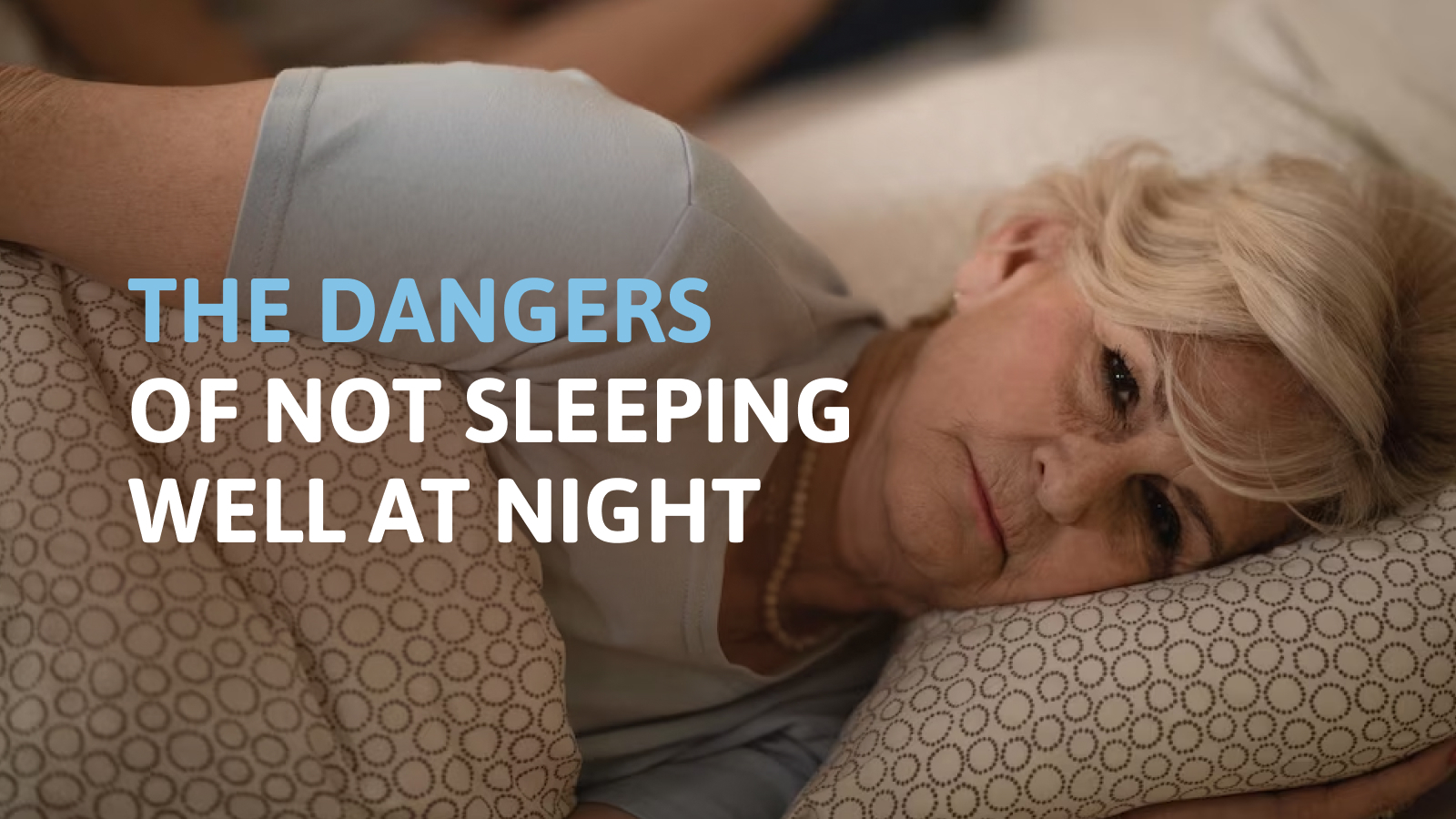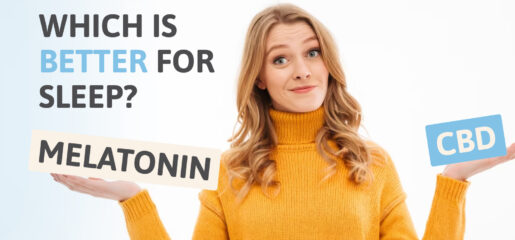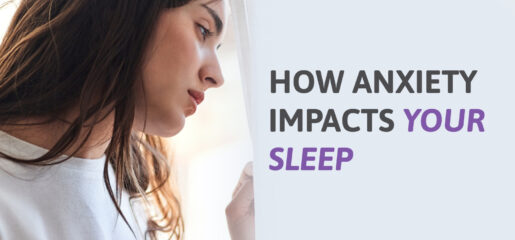
Getting consistently good sleep does more than just keep you from feeling groggy in the morning. Not getting the sleep you need can have significant health impacts, and the dangers of not sleeping well at night are very real.
Below, we’ll talk about some of the most prominent dangers of not getting enough sleep at night (especially in older adults), and we’ll provide some practical tips to help you get the sleep that you need!
Sleep Deprivation is Tied to Biological Aging
When you don’t get the sleep you need, it can trigger biological aging in your cells. A study performed by the University of California conducted a sleep study on 29 adults with ages between 61 and 86. They were allowed two normal nights of sleep, while the next two nights they weren’t allowed to sleep between 11pm and 3am, and then were required to wake up at 7am.
The results? Blood results showed “deterioration in the cell’s growth and division cycle,” which lead them to “casually link sleep deprivation to the molecular processes associated with aging.” Other research has shown that not getting enough sleep can be connected to markers of inflammation, which can be indicative of stress on the body, pain, or disease.
Getting enough sleep (at least six hours) is key to slowing down the biological aging of human cells.
Lack of Sleep Is Connected to Obesity
Not only is a lack of sleep connected to aging faster, it’s connected to obesity, too. A 2018 study showed that not getting enough sleep for any reason, including insomnia, were associated with “obesity, metabolic disorders, and cardiovascular disease.” This is especially true in older women, which was a specific focus of this study.
Why does not getting enough sleep put you at risk for obesity? There are several factors that can contribute, specifically:
- Unbalanced production of the hormones leptin and ghrelin, both of which play a role in regulating hunger. When you don’t get enough sleep, you’re more likely to feel hungry more often, which can lead to weight gain.
- A lack of sleep can increase cortisol production, often called the “stress hormone.” Increased levels of cortisol can increase your appetite and your desire to eat sweet and salty foods.
- If you don’t get enough sleep, you’re less likely to exercise, which can make it easier to put on unwanted weight.
Getting the sleep you need makes it easier for your body to maintain a healthy weight, and makes it easier to choose to eat nutrient dense, well-balanced meals.
Not Enough Sleep Can Cause Adverse Mental Health
Not getting the sleep you need puts you at risk for mental health issues. It’s well established that not getting enough sleep creates mental strain, and research suggests that those who chronically get less than six hours of sleep a night are 2.5 times more likely to experience mental distress.
This isn’t just for people who are predisposed to mental health challenges. Even those who are otherwise healthy can “experience increased levels of anxiety and distress” when they don’t get enough sleep. Of course, if you’re already predisposed to mental health challenges, then a lack of sleep can exacerbate those issues greatly.
Sleep Deprivation May Contribute to Cognitive Decline and Dementia
Along with mental health challenges, not getting enough sleep can contribute to overall cognitive decline and even dementia. Research has shown that even having a single bad night of sleep can result in the build up of beta-amyloid in the brain, which may form plaque over time, contributing to Alzheimer’s Disease.
Not only does not getting enough sleep increase the risk of Alzheimer’s and dementia, getting an appropriate amount of sleep can reduce the overall risk of cognitive decline.
Chronic Sleep Issues Can Increase Risk of Falling Accidents
If you thought that being chronically sleepy and groggy might increase the risk of falling accidents, you’d be correct. In a 2008 study that looked at older women and their sleep habits, researchers found that women who got five hours of sleep a night or less were more likely to have two or more falls in the subsequent year.
Another 2007 found that “objectively measured poorer sleep was associated with worse physical function.” This study looked at any physical function, not just at a fall risk. That means that getting enough sleep is crucial to maintain normal physical ability as we age, regardless of the risk of falling.
Not Enough Sleep Is Connected to Increase Alcohol Use
A lack of sleep has even been connected to increased alcohol use, which carries a number of physical risks on its own. The reason why not getting enough sleep is connected to alcohol use is likely because chronic sleep deprivation has been shown by research to cause depressive symptoms, as well as a decline in overall quality of life.
Lack of Sleep Is Connected to Dying Early
Finally, some research suggests that not getting enough sleep is connected to dying early in general. A batch of studies suggested that getting more or less than seven hours of sleep was correlated with a higher risk of dying, though the study admits that it couldn’t determine the exact reason why and that more research was needed.
However, at the very least, it seems that chronic sleep deprivation is associated with dying earlier across all age spectrums, including older adults.
How to Get Better Sleep
We know that it is crucial to make sure that you consistently get enough sleep (which research suggests is somewhere between 6-8 hours to night). However, how to get better sleep can be elusive, especially in older people, where sleep issues are more common.
We’ve gathered some research-backed tips that may be able to help you sleep better and more consistently:
Exercise
Exercise is extremely important for improving sleep regardless of your age. In a systematic review of sleep across a broad range of ages, researchers concluded that “physical exercise is an effective intervention for those who do not experience adequate sleep or quality,” even though the study admits that more information is needed about the exact biological mechanisms of sleep.
If you’ve struggled with consistent sleep but haven’t been exercising, it may be time to try! Even light exercise can be effective, though we encourage anyone to consult with their doctor before beginning a new exercise regimen.
Eat the Right Foods and at the Right Times
Eating the right foods not too late in the day can help you get better sleep, too. While research is still inconclusive, early studies suggest foods like vegetables, fruit, fish, and milk products may have sleep promoting effects.
When you eat can have an impact, too. Experts recommend not eating anything three hours before you plan to sleep, since there’s a higher chance that you’ll wake up in the middle of the night. and if you do have a snack, it should be something like fruits, vegetables, or yogurt.
Try CBD
A popular tool to help with sleep is CBD, which is a compound naturally found in the hemp plant. You’ve likely seen some kind of CBD product advertised online, and you may have seen CBD or hemp products in stores. While not all CBD products are the same, CBD you can inhale, swallow, or place on your skin with a transdermal patch may be key to helping you sleep.
In particular, CBD can help you sleep by helping manage chronic pain, helping manage anxiety and stress, as well as potentially directly combating insomnia symptoms.
Before you begin to use CBD, you should always consult with your doctor. CBD can interact with certain prescription medications, so you should always follow your doctor’s guidance on whether CBD is right for you.
CBD for Pain
If one of the reasons you aren’t getting enough sleep is because of chronic pain, CBD might be able to help! Studies have shown that CBD can potentially be an excellent pain reliever, even against “chronic pain, for which primary treatments are insufficient or not possible.” Unlike other pain medications, especially opioid medications, CBD isn’t habit-forming and has mild side-effects that are generally well-tolerated.
CBD for Anxiety
Anxiety is commonly linked to sleep problems, and if you’re having trouble managing anxiety, then CBD may also be able to help. There are multiple studies that suggest CBD is effective at reducing anxiety and that those benefits potentially last as long as CBD continues to be used.
These studies aren’t just looking at CBD and general stress. Research suggests that CBD can be effective at treating a broad range of anxiety disorders, including obsessive compulsive disorders and post-traumatic stress disorder.
If you struggle with anxiety, CBD may provide the relief you’re looking for, even if other medications, like traditional antidepressants, haven’t provided desired results.
CBD for Sleep
Finally, you may struggle to sleep for no particular reason (which is what often happens with classic insomnia). Even if you aren’t struggling with anxiety or pain, CBD may offer direct benefits to helping you get better sleep.
A pilot study showed that medium to high doses of CBD are associated with higher percentages of total sleep, while another study showed a positive association between using CBD and getting better quality sleep.
All of these studies state that more research is needed to understand exactly how CBD impacts sleep directly, but high-dose CBD may be worth trying if you struggle with chronic insomnia.
How to Use CBD for Sleep
If you want to use CBD for sleep, there are several factors to consider, including how you take it and what kind of CBD formula you choose. Readers should note that CBD impacts different people in different ways, and you should take the time to consider your specific needs and find a CBD product that is the best match.
Consider How You Take CBD
There are three primary ways to take CBD, and each way will impact you differently:
- Inhaled CBD: Inhaled CBD is usually done through a vaporizer, where a battery heats coils that vaporize liquid, which is then inhaled. Inhaling CBD provides fast-acting relief, though the effects tend to be shorter than other forms. PhenoPen is an example of a device that provides inhaled CBD.
- Ingested CBD: Ingested CBD is CBD that is swallowed. This can be in the form of a gummy or candy, as well well as tablets or capsules. This form of CBD takes longer to start providing relief, but will provide longer-lasting effects. PhenoGel is an example of ingestible CBD in the form of capsules.
- Transdermal Patches: Transdermal patches deliver CBD into your bloodstream directly through your skin. It can take some time for these patches to start providing relief (upwards of an hour), but their effects are the longest lasting. They’re designed to be worn for eight hours, with effects lasting beyond that timeframe. PhenoPatch is an example of a transdermal patch.
Use Different CBD Methods Together
It’s not uncommon for customers to use CBD products together to take advantage of the unique benefits. For example, it’s common to take a few puffs of PhenoPen for quick effects (which can help you fall asleep), while taking PhenoGel or using PhenoPatch for longer lasting effects (which can help you stay asleep).
Consider Catered Formulas
In addition to how you take CBD, there are several CBD formulas that are catered for specific effects. For example, PhenoLife has developed three catered formulas designed to target specific health challenges:
- Body: Our Body formula uses full-spectrum CBD and CBE, another cannabinoid found in hemp that may provide extra relief from pain and inflammation.
- Mind: Our Mind formula uses full-spectrum CBD and CBG, another cannabinoid found in hemp that may provide extra support for soothing anxiety and stress.
- Sleep: Our Sleep formula uses full-spectrum CBD and CBN, another cannabinoid found in hemp that might give more potent effects to help you fall asleep and stay asleep.
Keep in mind, you don’t have to use a catered formula (for example, we still offer all of our products in our original, full-spectrum CBD formula). However, some customers may find better or faster results if they know precisely why they want to take CBD, be it for pain, anxiety, or general sleep issues.
Sleep Deprivation Is Dangerous: Summary
If you aren’t sleeping well, you can’t afford to ignore it. In particular, lack of sleep:
- Is tied to biological aging
- Is connected to obesity
- Can cause adverse mental health
- May cause cognitive decline and dementia
- Is connected to a risk of falling accidents
- May increase alcohol use
- Is overall associated with dying earlier
We’ve also covered how to get better sleep, including eating better and avoiding eating right before you sleep, getting regular exercise, and trying CBD.
If you’re interested in trying CBD to help with sleep, and you have questions, we’d love to help! The experts at PhenoLife can make sure you fully understand how CBD impacts your sleep, and which CBD products may be the best fit for your specific health challenges.
If you’re ready to start shopping, start with PhenoLife! All of our products are backed by our online Certificate of Analysis, so you can see for yourself that our products are pure and safe. You can also visit our online store and take a look at the variety of CBD products we offer.

